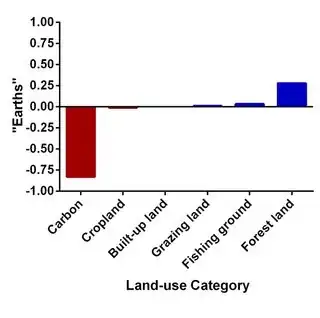Yes, the 'ecological footprint' can be useful in suggesting areas where humanity has unsustainable practices which need to be improved.
However, the footprint is usually presented in a very misleading way, as it dramatically oversimplifies sustainability and implies that all efforts to achieve sustainability are equal. If such a score was used as a basis for public policy or private efforts, then there is a chance that little would be done to fix the underlying problems: in order to raise the homogenized sustainability score above some threshold, effort may mistakenly focus on making sustainable things more sustainable, rather than making unsustainable things less unsustainable.
The info and references in this answer come from this paper that examined ecological footprint methodologies. It comes from PLOS, a decent, peer-reviewed journal, so it and the articles it cites seem trustworthy enough.
The intro of the PLOS article details that the methodologies behind the footprint calculation are sound enough to be widely used, but that it is not presented in a useful way:
First popularized in the mid-1990s by Wackernagel and Rees 3, the EF has influenced the policies and communications of many governmental and non-governmental organizations. For example, EF metrics feature in the World Wildlife Fund's Living Planet Report, Worldwatch Institute's State of the World, the Global Environment Outlook of the United Nations Environment Program, the United Nations Development Program's Human Development Report, and the International Union for Conservation of Nature (IUCN)'s Transition to Sustainability; the Convention on Biological Diversity chose the EF as a key biodiversity indicator 4–[9].
...
Any global metric that attempts to capture and summarize a range of large-scale and complex phenomena is sure to entail simplifications, biases, errors, and gaps. Such limitations are unavoidable and must be traded off against the benefits, such as their utility for prioritization, target setting, and communication. This Perspective intends to demonstrate, however, that EF measurements, as currently constructed and presented, are so misleading as to preclude their use in any serious science or policy context.
Apparently, much of the popular metrics and methodology behind determining the ecological footprint, such as this paywalled article, come from the Global Footprint Network, who also seem to be the group behind Earth Overshoot Day.
Below is an example figure demonstrating Global Footprint Network metrics behind claims like 'humans use 1.5 Earths':

The figure is essentially showing the sum of 'capacity produced' and 'capacity consumed', i.e. we use 1.75 Earths worth of yearly carbon production and 0.67 Earths worth of yearly forest growth. As can be seen, claiming that we are using 1.5 Earths of resources is a complete oversimplification.
However, even the above metrics are built on some faulty premises. As the PLOS article explains:
When the global EF is decomposed into its six components (Figure 1), none of the five non-carbon land-use categories has any substantial ecological deficit—suggesting that depletion of cropland, grazing land, forest land, fishing grounds, and built-up land is not occurring on an aggregate, global level.
...
These figures appear to indicate a sustainable pattern of consumption, with productivity rising to meet growing demand [18],[21]. Another interpretation is that, beyond fossil-carbon waste, the EF is a poor representation of how well we are managing the planet, because a wide range of studies indicate that harm to Earth's ecosystem services is already significant, including declining soil fertility, increasing water scarcity, lowering of groundwater tables, oft-depleted fisheries, and loss of evolutionary history through species and population extinctions [22]–[26].
Essentially, Earth Overshoot Day completely oversimplifies sustainability: when it says we've consumed "a year’s worth of carbon, food, water, fibre, land and timber in a record 212 days.", we've actually consumed a years worth of carbon in less time, and have a surplus of everything else.
However, even if we break the footprint down each piece is still very misleading. Does forest growth in Maine cancel out the effect of deforestation in the Amazon? Does growth of salmon populations cancel out the depletion of cod? Does growth of arable land in Siberia cancel out desertification in Africa? The answer to all these questions is an obvious 'no', but do not appear to be covered in metrics used to determine humanity's ecological footprint.
In short, these metrics can be used to suggest areas that need improvement or more research into sustainable practices, but do little to truly identify or fix the actual problems. Planting some trees in your verdant local park or consuming less beef from cows grazing the stable plains of Texas are nice gestures, but are essentially worthless when it comes to global sustainability.
